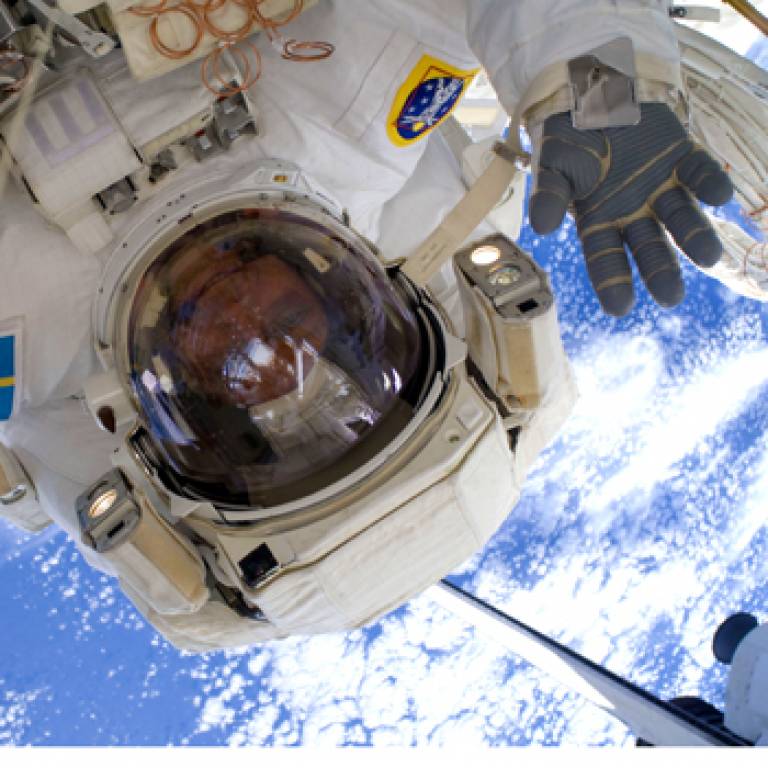UCL duo represent UK at astronautical congress
5 November 2009
Links:
 ucl.ac.uk/neuroscience/" target="_self">UCL Neuroscience
ucl.ac.uk/neuroscience/" target="_self">UCL Neuroscience
One current and one former student from UCL have represented the UK at the prestigious International Astronautical Congress (IAC) in South Korea.
The European Space Agency (ESA) sponsored PhD student Daniela Petrova and alumnus Charles Groome (UCL Neuroscience) to attend the event, which was held in Daejeon in October.
Every year ESA sponsors a small number of students from its 18 European member states to attend the IAC, which promotes awareness of space activities worldwide.
Daniela is currently a final year PhD student at the Institute of Ophthalmology and aims to complete her research and medicine studies at UCL before continuing as a medical professional and researcher in the space and biomedical technology fields.
At this year's congress, she presented four papers on her visual neuroscience research on colour vision and temporal nonlinearities and their application for long-duration spaceflight.
She said: "Visual neuroscience is of great importance for the upcoming long-duration exploratory missions to the Moon and Mars. There is still much that remains unknown about the changes in colour and motion perception in microgravity.
"I am very grateful to have been given the chance to represent UCL and the UK at ESA and IAC this year. I would like to continue to be involved in space medicine and microgravity research."
Charles is preparing for an Investment Management Certificate and hopes to become a research analyst for financial firms looking to invest in pharmaceuticals and biotechnology.
He presented research on the physiological similarities between ageing and microgravity, which was one of a number of applications of his final year project at UCL.
He said: "My presentation looked at the sub-cellular basis for well-documented similarities between physiological alterations that occur in microgravity and in senescence (growing old).
"These include muscle atrophy, osteoporosis and increased stress hormones. In microgravity these changes are mostly reversible, whereas in senescence these changes are the result of as yet irreversible accumulating damage. My interest as applied to space is in understanding how microgravity alters the function of sub-cellular components in this reversible fashion.
"In general, I am interested in research identifying novel ways for removing age-related damage against which humans have not evolved means of protecting themselves.
"Besides giving me a platform to present, IAC 2009 gave me the opportunity to learn a great deal of the science, technology and ideas currently being advanced in many space-related fields, as well as meet a number of interesting people affiliated with various international space agencies."
Both Daniela and Charles thanked ESA and encouraged other students with an interest in space science, exploration and collaboration to apply for sponsorship to attend next year's IAC, which will be held in Prague.
Daniela also encouraged students to explore the opportunities offered by the UK Space Biomedicine Association (UKSBA), where she volunteers as secretary on the Executive Committee.
She added: "The UK Space Biomedicine Conference on Saturday 7 November will be a particularly good opportunity to get involved - it is how I first got involved in the space biomedicine field."
For more information about the IAC, ESA or the UKSBA, follow the links above, or contact Daniela Petrova for details of other opportunities.
Image: top right, ESA astronaut Christer Fuglesang on a spacewalk at the International Space Station (credit: ESA); bottom left, Daniela Petrova and Charles Groome at the IAC in South Korea
UCL context
UCL Neuroscience focuses on understanding how the nervous systems works, making fundamental discoveries about brain function and behaviour, and teaching and training the next generation of scientists and clinicians.
The world-leading UCL Institute of Ophthalmology - ranked outstanding in the UK's most recent Research Assessment Exercise - conducts cutting-edge research in pursuit of its ultimate goal of improving sight.
Related stories:
UCL awarded largest ever UK grant to investigate causes of Parkinson's
UCL student joins hunt for life on Mars
 Close
Close

